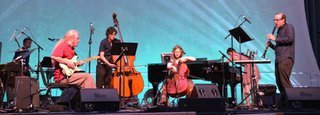|
Back
Super! Sonic!! Booms!!! New York
Zankel Hall, Carnegie Hall
04/19/2017 -
David Lang: cheating, lying, stealing
Julia Wolfe: Lick – Early That Summer
Michael Gordon: Yo Shakespeare
Bang on a Can All-Stars: Ashley Bathgate (Cello), Robert Black (Bass), Vicky Chow (Piano and Keyboard), David Cossin (Percussion), Mark Stewart (Electric Guitar), Ken Thomson (Clarinets and Saxophone); With Keith Kathman (Flute and Pan Pipes), Roberta Michel (Flute and Pan Pipes), Peter Hess (Saxophones), David Fried, Michael Gordon (Keyboards), Nathan Koci (Accordion), Todd Reynolds (Violin), Gregg August (Electric Bass); JACK QUARTET: Christopher Otto, Austin Wulliman (Violin), John Pickford Richards (Viola), Jay Campbell (Cello)

Bang on a Can All-Stars (© Courtesy of the Artists)
Call it energy, or fervor or unyielding undermining dynamics. The three composers who made up the second part of “Three Generations”–those between Glass/Riley “oldsters”and the Muhly/Dessner young ‘uns–were different in approach and sounds. Yet from the very first three notes from David Lang’s cheating, lying, stealing to the final whizz-bang of Michael Gordon’s Yo Shakespeare (both titles inscrutable despite the composers’ explanations), Zankel Hall was filled with metaphysical explosions.
Part was due, of course from the two groups of performers, Bang on a Can (now in its 30th year), and JACK Quartet, a new grouping with the dynamic cellist Jay Campbell. Nothing played by either of these technically amazing groups can be anything but driving and (within the limits of the notes) seemingly impulsive.
I have a feeling that if Bang on a Can or JACK played Tchaikovsky’s Andante cantabile, they would–without changing tempo or rhythm–turn the slow-driving Russian troika into a Maserati.
In this case, though, two of the composers were custom-made for these groups. David Lang was in a different category, simply because nothing that he writes is a repetition of anything else. His music constantly sings, but the voices can illuminate an 18th Century hanging or a 45-minute monologue, or, a little match girl passion.
And here, his cheating, lying, stealing was an electrifying discourse on a) three notes of a minor triad; b) a pentatonic scale with Arabic undertones. Yet Mr. Lang never had problems with either. Those first three sforzando notes were repeated over and over again, with a ferocious pacing, with minimal/maximal permutations, fractional changes of rhythms, the crochets from the stamping of sax player Ken Thomson, the sounds held together by piano and percussion–and a disconcerting lyrical undertow from that iconic cellist Ashley Bathgate.
Suddenly, the whole style changed. On the vibraphone ensued that descending-ascending Near East scale, the other notes blended in–and finally, Mr. Lang brought the two parts together. Not as a quodlibet, but as a deliberate paean to the joy of opposites. Even if he noted in the score to play it as “ominous funk”, or defining it as “a swagger, but not trustworthy” methinks that direction was more a typical David Lang verbal twist than a literal reality.
Julia Wolfe is part of this generation as well. She and Michael Gordon had complex structures, but their music was based on simple, almost primitive cells. Ms. Wolfe’s Lick was, yes, the old jazz term, and from the start, the Bang on a Can All-Stars were playing in a variety of Big Band rhythms. Not exactly Stan Kenton, not really Motown or funk, but dance music. Highly convoluted, high-energy, twisted but always a kind of dance/dance/dance sound.
Sound above all.

JACK Quartet (© Shervin Lainez)
As she so well illustrated in her second work, this for JACK Quartet, Early That Summer. The genesis of the title has something to do with political histories, events of which may begin “Early that summer”. The result could have been anything at all. And like virtually every work last night, it reckoned on a few notes (or in this case, a non-stop vicious tremolo) to expand.
I say “tremolo” but there is probably a more technical terms for the four players whose bows went up and down decisively, ceaselessly, one could say viciously. Initially, I thought that two of the instruments could have been tuned a quarter-tone up, but the four-part harmony was just as easily a concordance. And like Ms. Wolfe’s Lick, the music echoed a bodily sympathy (using the original meaning of the term), with our own inner energies. Not in this case with dance, but with something more savage, even with the almost sanitary cleanliness of the notes.
Which ended, somehow with a few mournful notes, cryptic questions.
The finale was Michael Gordon’s equally danceable Yo Shakespeare. I turned to YouTube last night to get a preview. The music, I confess, was secondary to one of the most charming videos an animal-lover can ever see (In this case), with a dozen-odd cats graphically playing, chasing a virtual butterfly, doing other stuff to his 12-minute-long music.
Mr. Gordon’s Yo Shakespeare was a puzzlement of triplets.He explained it in words better than mine: “...to have a jagged, interrupted rhythmic plot that at the same time feels pulse-based and moves forward energetically.”
“Energetic” is not quite the word. The full Bang on a Can All-Stars augmented by the artists listed above (including the composer on keyboard) left us poor listeners gasping, trying to find a note to hang on. Mr. Gordon speaks about a “split triplet”, but in this case, the large ensemble, the percussion, keyboards, Ms. Bathgate drumming her cello standing up, didn’t simply split the triplets. They were drawn, quartered, ripped piece to piece, torn asunder, tossed into the Zankel Concert Hall atmosphere, and somehow came to earth (or stage) not fully resurrected, but obviously ready to go on another odyssey.
It was, like the other works last night, both wild and unnerving. After the concert, Steve Reich was speaking with the composers, but I couldn’t bring myself to stay. The metaphorical body was wrung dry, submerged into a hot pool and then left to wobble out into an oh so mundane Manhattan.
Harry Rolnick
|